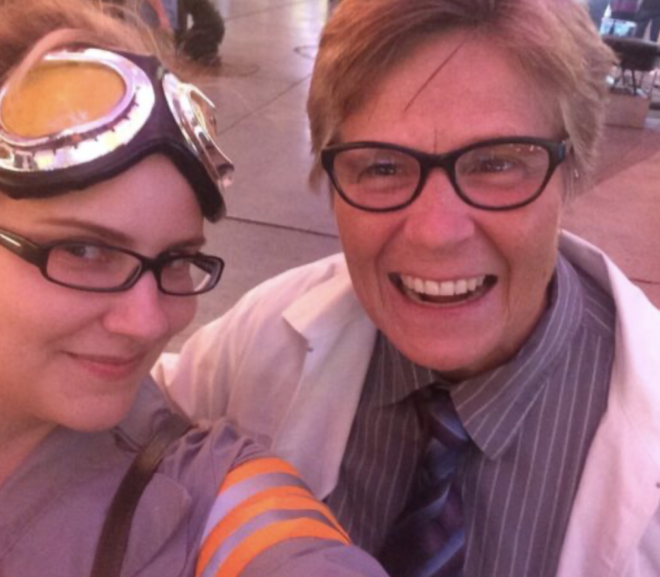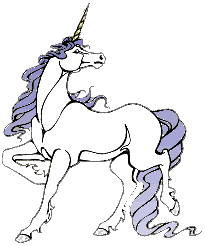I feel things so intensely, and when that’s a good emotion, it’s the best thing in the world. I feel joy with every bone in my body. When someone else is happy, I feel it too.
Tag: empathy
Why does the media keep letting parents of autistic kids exploit those kids’ most vulnerable moments? Autistic writer Sarah Kurchak talks to her mom Jane about why such stories aren’t parents’ tales to tell, and why Jane will never write about raising Sarah.
Elizabeth Bartmess runs the autistics-and-cousins autchat discussions on Twitter, and also writes and critiques autism-themed fiction. We talked with Bartmess about why autchat matters, sometimes in surprising ways, and also about why “‘Autistic character learns empathy’ is the character arc I most wish would go away.” Elizabeth Bartmess [image: photo of a white person with short light brown hair and glasses, smiling.] Thinking Person’s Guide to Autism: Tell us about autchat. What is it, exactly? Elizabeth Bartmess: Autchat is a Twitter hashtag by and for autistic people and “autistic cousins”—people who have similar experiences due to other disabilities like hydrocephalus, cerebral palsy, ADHD, etc. We welcome people whether they are formally diagnosed, self-diagnosed, or wondering whether they might be autistic or similar. We have weekly hour-long chats on our experiences, with topics such as accommodations, burnout, and sexuality. During a chat, the moderator asks 4-5 questions and participants answer them.…
Nicole Nicholsen womanwithaspergers.wordpress.com Rachel Cohen-Rottenberg’s Autism and Empathy website started me thinking about the whole empathy question in regards to autistic people — again. In my first post about autistics and empathy, I mentioned Theory of Mind issues as one of the possible reasons why there is a perception that autistic people lack empathy. With what I had read about Theory of Mind at the time, I’m now reexamining the concept and wondering if I had gotten it slightly wrong, especially in light of the recent challenges that other autistic writers have made to the prevailing ideas about autistics and Theory of Mind. The Sally-Anne Test The prevailing idea about autistics and Theory of Mind goes something like this: having good Theory of Mind means that a person is able to determine the contents of both one’s own mind and the minds of others; conversely, autistic people are unable to…
Some news coverage in the last 24 hours has mentioned autism in the context of the tragedy in Connecticut, particularly referencing Aspergers or “high-functioning” autism. Talking heads have brought up the “empathy” factor when discussing autism, and I’d like to set some of the record on that straight. Empathic ability comes in two forms. One is the social ability to recognize the emotion someone is feeling by following social cues, subtle vocal fluctuations, and other nonverbal communications. Psychopaths, for example, might be quite good at reading people, at applying this cognitive empathy and then possibly exploiting it. Autistic people, on the other hand, generally tend not to be that great at this kind of recognition in non-autistic people. After all, the hallmark of autism is difficulty navigating this territory and registering the meaning of a nonverbal language that is unfamiliar to them. Worth noting, non-autistic people also seem to struggle…
…One Unicorn at a Time. Carol Greenburg aspieadvocate-ascd.blogspot.com We Unicorns seldom have a chance to gather in the magical wild lands of Manhattan, but thanks to a press pass arranged by Sharon daVanport, president of Autism Women’s Network, I got to meet another of my species at a panel entitled Autistic and Female: They say That’s Rare and so Many Other Things at the Disability Studies in Education conference at Hunter College, on May 27: Dr. Elizabeth “Ibby” Grace. With a generous dollop of the whimsy autistic people are alleged to lack, Dr. Grace, an assistant Professor with the Diversity in Learning and Teaching Department and research methodologist at Louis University in Chicago, used her unicorn analogy to expose the myth behind the assumption that females with autism are rare. In fact, Dr. Grace maintains, autistic girls and women like her, and like me, are everywhere, but vastly under-identified and…
Zoe Gross illusionofcompetence.blogspot.com Zoe and her father Rob light candles in honor of George Hodgins. Photo © 2012 Steve Silberman Zoe is an autistic self-advocate. She recently organized and led a vigil to remember and honor George Hodgins. She read the words below at the ceremony, which was attended by self-advocates and their supporters — many of whom had been part of George’s life. Many of whom spoke out themselves. —- Last Tuesday, George Hodgins was shot and killed by his mother, who then killed herself. George lived here in Sunnyvale and he was 22 years old. I didn’t know George, but I can’t stop thinking about him. Maybe it’s because we have a lot in common — we lived near each other, we were the same age, we’re both autistic, although we led very different lives. I would like to have met George, but I can only mourn him.…
(Or, A Good Dose of Humility Never Hurts) Kim Wombles www.kwomblescountering.blogspot.com I’ll have been involved in the online autism community for three years this March. I’d say the community has changed, but I’m thinking it’s more that I changed over the years. People still bicker about the same kinds of things (some of the people are the same ones who’ve been at it for years), and the divides seem to be more entrenched than ever before, if you go looking in those places. I try to avoid that, now. Sometimes, when I make the round of blogs, of bloggers posting their deepest feelings, only to be roundly attacked by others, I want to respond, to get into the middle of things. Most of the time, though, now, I don’t. I shrug and move on. I ask myself first what possible good could come out of my investment. It isn’t that…
Carol Greenburg aspieadvocate-ascd.blogspot.com I feel sorry for those who think autistics have no ability to empathize. In my case at least, Asperger’s left me too vulnerable to the emotions of others. When I was a little girl, I smiled until my face hurt. I was nowhere near as delighted as the constant smile seemed to indicate, but I was not miserable either. The unrelenting smile was, I now believe, the product of rigid autistic thinking, which had led me to a false conclusion that like everything else in my world, there was a correct and incorrect path. Blocks must be stacked in a certain formation, every imaginable question had right and wrong answers. By that admittedly skewed, reasoning, the same principal must have applied to emotion. There was one correct emotion: happiness, which was always expressed with a smile. Other emotions existed, that was irrefutable. Whatever other explanation could there…
Mir Kamin Woulda Coulda Shoulda (wouldashoulda.com) For the first time in a very long time, it felt like things were okay. Good, even. Things were going to be great, in fact, and once I got the kids settled in to our new town, new house, new life … things would only get better. So there I was in the office of the one and only psychiatrist in town our new health insurance would pay for, who would also see children younger than twelve. My son was only seven, but for the past year he’d done well on an anti-depressant to help control his anxiety. I’d had reservations about medicating him — of course I did — but it helped. It helped a lot, actually. All I needed from this doctor was a new prescription for the medication that we already knew was working fine. I’d brought his medical records and…




